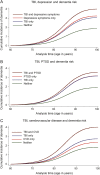Traumatic brain injury and risk of dementia in older veterans
- PMID: 24966406
- PMCID: PMC4115602
- DOI: 10.1212/WNL.0000000000000616
Traumatic brain injury and risk of dementia in older veterans
Abstract
Objectives: Traumatic brain injury (TBI) is common in military personnel, and there is growing concern about the long-term effects of TBI on the brain; however, few studies have examined the association between TBI and risk of dementia in veterans.
Methods: We performed a retrospective cohort study of 188,764 US veterans aged 55 years or older who had at least one inpatient or outpatient visit during both the baseline (2000-2003) and follow-up (2003-2012) periods and did not have a dementia diagnosis at baseline. TBI and dementia diagnoses were determined using ICD-9 codes in electronic medical records. Fine-Gray proportional hazards models were used to determine whether TBI was associated with greater risk of incident dementia, accounting for the competing risk of death and adjusting for demographics, medical comorbidities, and psychiatric disorders.
Results: Veterans were a mean age of 68 years at baseline. During the 9-year follow-up period, 16% of those with TBI developed dementia compared with 10% of those without TBI (adjusted hazard ratio, 1.57; 95% confidence interval: 1.35-1.83). There was evidence of an additive association between TBI and other conditions on risk of dementia.
Conclusions: TBI in older veterans was associated with a 60% increase in the risk of developing dementia over 9 years after accounting for competing risks and potential confounders. Our results suggest that TBI in older veterans may predispose toward development of symptomatic dementia and raise concern about the potential long-term consequences of TBI in younger veterans and civilians.
© 2014 American Academy of Neurology.
Figures


Comment in
-
Head trauma and neurodegeneration in veterans: an additional piece of the puzzle.Neurology. 2014 Jul 22;83(4):298-9. doi: 10.1212/WNL.0000000000000630. Epub 2014 Jun 25. Neurology. 2014. PMID: 24966404 No abstract available.
References
-
- Institute of Medicine of the National Academies. Gulf War and Health: Volume 7: Long-Term Consequences of Traumatic Brain Injury. Washington, DC: National Academies Press; 2008 - PubMed
-
- Breteler MM, de Groot RR, van Romunde LK, Hofman A. Risk of dementia in patients with Parkinson's disease, epilepsy, and severe head trauma: a register-based follow-up study. Am J Epidemiol 1995;142:1300–1305 - PubMed
-
- Guskiewicz KM, Marshall SW, Bailes J, et al. Association between recurrent concussion and late-life cognitive impairment in retired professional football players. Neurosurgery 2005;57:719–726 - PubMed
Publication types
MeSH terms
Grants and funding
LinkOut - more resources
Full Text Sources
Other Literature Sources
Medical
